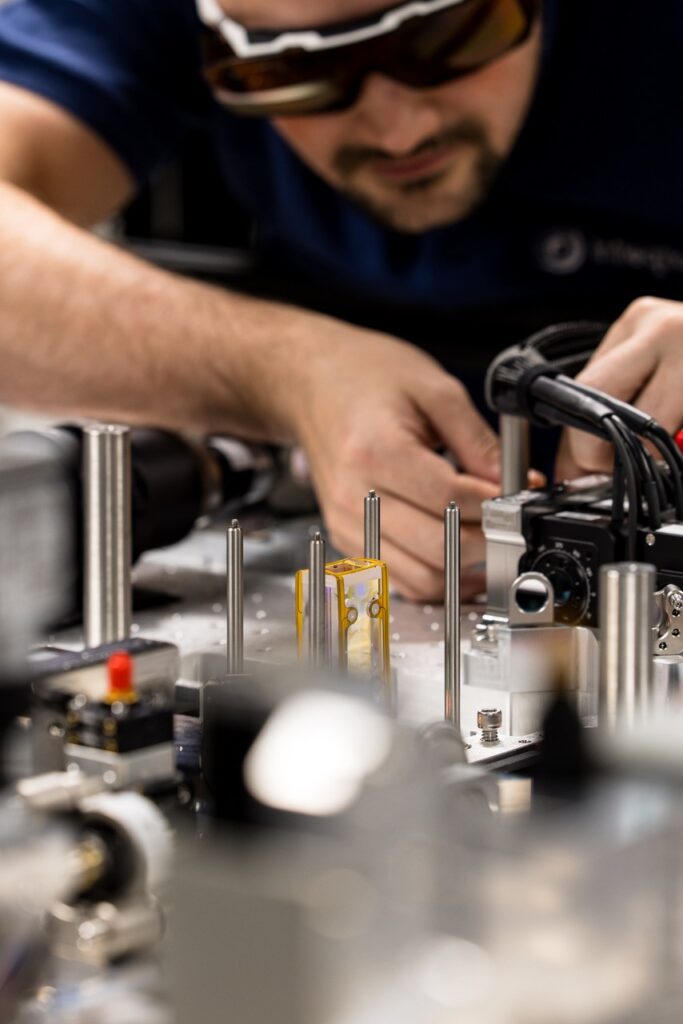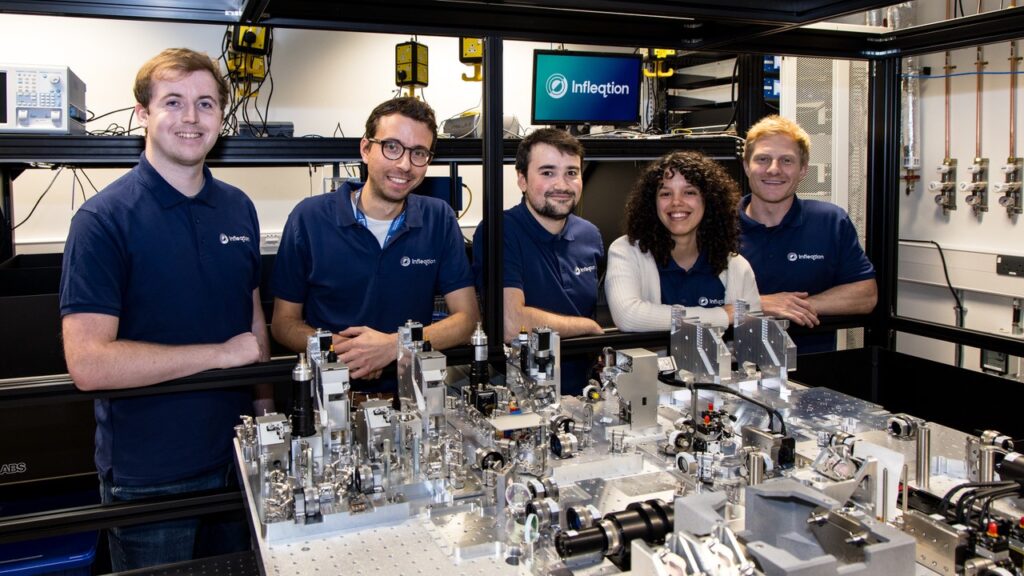
Infleqtion helping ignite UK quantum growth
Global quantum firm Infleqtion plans to create at least 100 high paid, advanced manufacturing jobs and build a production line in the UK – with strong support from the Harwell Quantum Cluster.
Infleqtion is already delivering a cutting-edge neutral atom quantum computer for the National Quantum Computing Centre (NQCC) based at Harwell Innovation Campus. And it’s planning to open a UK manufacturing center as soon as its Series C funding raise is concluded.
Marco Palumbo, UK Director of Business Development, said: “We’re extremely grateful to the NQCC and Harwell for their support and help in our growth.
“The Harwell site fantastic – we love being there. There’s a diverse range of people from multiple sectors exploring synergies. We can all grow together.”
…And Infleqtion is doing just that. The company is investing funding into a UK manufacturing function – to make, and bring to market cutting-edge quantum computers, quantum clocks, quantum enabled navigation and position sensors, and quantum RF receivers.
Dr Palumbo added: “It’s very exciting. We want to hire 100 people in the next three years, and have a manufacturing line in the UK by next year.
“At the moment, there’s a real skills shortage within systems engineering – people who can work across components, systems and networks.
“So, we’re ready to train directly our own workforce. If we don’t do it, no one else is going to do it. And if not now, when?”
Delivering Quantum Innovation
Government chose Harwell Innovation Campus to be the home of its new National Quantum Computing Centre (NQCC). The strategic hub and the national laboratory was backed by an initial £93 million of investment through UKRI*, and aims to push the boundaries of what’s possible using quantum computing technology.
The NQCC offers a 4,000 sq. metre state-of-the-art building including meeting, office and laboratory spaces to host 12 quantum computers by spring 2025, which will support breakthrough projects.
Currently, more than 70 people work in the NQCC, and it provides an array of opportunities for students – including support for the quantum apprenticeships, 30 PhD studentships over 8 years, summer placements, quantum hackathons, and crash courses for those in industry.

It’s all designed to support the development of quantum hardware, software, and applications. And, it is built just a few metres away from the existing critical research facilities of the Science and Technology Facilities Council (STFC), as well as several businesses within the quantum supply chain.
Najwa Sidqi is the Manager of the Harwell Campus Quantum Cluster – a growing community of innovative quantum businesses. She said: “The NQCC represents a significant investment in the UK’s quantum future, and Harwell was selected as its location due to its secure environment and the presence of critical research assets. We recognise the transformative potential of quantum technology to drive economic growth, and we are committed to ensuring a strong return on investment by focusing on skills development and fostering collaborations across the sector.”
“The NQCC is a facility that the UK should be particularly proud of because this nation kickstarted quantum; our government has taken it really seriously since 2014. It’s not really like that elsewhere – like the USA – where quantum has mostly been championed by primes like IBM and Google. In the UK Government has shown support for the quantum industry for almost 10 years now and we are hopeful that this will be the case for the next decade too.
“NQCC allow us to establish ourselves as a vendor, develop IP in the UK, and have an office within their building.”
About Infleqtion
Infleqtion creates compact, consistent, and scalable quantum devices – from individual components to software, hardware, and communications through to entire, plug-and-play systems. The company specialises in delivering Algorithms and Applications, Positioning, Navigation, and Timing and Quantum Sensing.
Infleqtion aims to commercialise atom-based quantum products which deliver orders-of-magnitude improvements in sensing, computing applications, precision and power. And all while generating streams of high-value information for commercial organisations.
In parallel, Infleqtion is working to make its quantum technologies as accessible and adaptable as possible so that users can achieve practical results with quantum as quickly as possible, within industries, businesses, and communities.

The company has 17 years’ experience across computing, sensing, AI, software, and quantum RF – but, according to Dr Palumbo, still thinks and acts like a spin out or start up.
He said: “We’ve got more experience than a lot of companies, which means that we made mistakes and learnt from those before anyone else – and you cannot buy your way into that kind of learning. Now, our delivery and knowledge of atom technology/lasers is unparalleled in the world.
“We’ve been in the UK for nine years and we want to be here for the foreseeable future– we’re totally committed.”
Applications and projects
Infleqtion is addressing critical market needs in Positioning, Navigation and Timing (PNT), Global communication, Security; Resilient energy distribution, and Accelerated quantum computing.
The team has forged strategic partnerships with a wide range of high-calibre organisations including the US government, NASA & several allied institutions, as well as UK bodies like the NQCC and Oxfordshire County Council:
Projects include:
- NQCC – Working with NQCC to install a cutting-edge neutral atom quantum computer, as well as establish crucial infrastructure components such as network infrastructure, safety protocols, and security measures
- Oxfordshire County Council – Working with Riverlane, and QinetiQ – using quantum optimization to tackle complex, deep-rooted traffic management challenges. The aim is to support under-resourced local authorities with new ways to plan infrastructure effectively
- Atomic Clocks – As part of its manufacturing expansion, Infleqtion is developing a highly accurate, reliable optical ‘atomic clock’. It would replace or back up existing GPS/satellite-led systems, which suffer from spoofing, as well as outages.
“It has been estimated by Government that the UK economy could lose up to $1bn a day through GPS outages – and it could be more, as there’s always an element of panic that kicks in,” said Marco. “We’re using quantum technology to develop a highly effective replacement or back up system, which could help to solve this threat”.
How it works
Qubits, are the basic unit of information in quantum computing. Artificial qubits (like in superconducting circuits) – are treated like the ‘stars of the show’ within quantum computing.
But Infleqtion focuses on atoms – working at that level to control the flow of information.
“We believe that nature offers the perfect qubits – atoms – because they always have the same characteristics,” said Marco.
“Infleqtion knows how to control them really well with lasers and magnetic traps. Neutral atoms don’t have the drawback of another atom based solution, ion traps, that because is based on ions that tend to repel each other will eventually suffer of a scaling issue. Neural atoms instead can be arranged in essential any 2-D or 3-D structure you can imagine of, hence scaling to 100s or 1000s or more qubits matrix is relatively straightforward compared to our quantum computing platforms”
And he should know. Dr Palumbo is former Innovation Lead in the Quantum Technologies Challenge team, a unit responsible for more than £300m of investment in the quantum industry in the United Kingdom (UK) to date. He also served as the Principal Licensing and Ventures Manager at Oxford University Innovation. There, he managed an extensive portfolio of intellectual properties and was instrumental in creating 12 University spin outs, with six of them being quantum technology companies including fellow Harwell resident, Orca Computing.
“Quantum will be transformational – it will have a massive impact in many fields, businesses and industries. But pretty soon we’ll just be talking about “technology that works” – because quantum will be there without people even realising it. It will be extremely accessible,” said Marco.